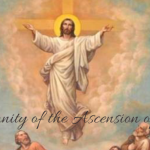Peter Leithart
Should you be struck by a sudden impulse to run your fingernails ’cross your pate, wondering what this odd hybrid “Reformational Catholicism” could be, bear with me through this. Mr. Leithart is not talking about the Counter Reformation. Nor is he talking about Catholicism at all—not in any sense that would be understood by one who knew that words mean things and the meaning of them is fixed. What he is rather talking about (so he tells us at First Things) is “the end of Protestantism,” only without repatriation to the Church. In other words, Protestant Sect No. 50,001.
DAZE MY EYES WITH THAT FEDERAL VISION
I confess I have not been paying too much attention to the conflict over Mr. Leithart and his “Federal Vision.” 50,000 internal squabbles don’t much interest me as they used to. I became much more interested when he published this article last month about the “tragedy” of Protestants converting to Catholicism, his argument being that older is not necessarily better. (An odd argument to make in a publication called First Things.) I had a brief temptation to respond, but Bryan Cross and Jason Stellman had already given good responses here and here.
But Mr. Leithart’s latest musings are too bizarre to let go. They form not so much an article, or an essay, as they do a syllabus of antitheses, which are occasionally held together by a weak glue of context. Here is the kind of antithesis you will find on the blog:
A Protestant exaggerates his distance from Roman Catholicism on every point of theology and practice. … A Reformational Catholic cheerfully acknowledges that he shares creeds with Roman Catholics. …
A Protestant believes (old-fashioned) Roman Catholic claims about changeless stability. A Reformational Catholic knows that Catholicism has changed and is changing.
Some Protestants don’t view Roman Catholics as Christians. … A Reformational Catholic regards Catholics as brothers. …
A Protestant views the Church as an instrument for individual salvation. A Reformational Catholic believes salvation is inherently social. …
On it goes. I do appreciate Mr. Leithart’s willingness to call Catholics his brothers, and to find his heritage in (some) Catholic theology. But when words like these come from a man who, just last month, called conversion to Catholicism a “tragedy,” they are empty of any sound and hollow of any sting. Mr. Leithart’s real point in writing the article seems to be this: A pox on both your churches.
The reason I say that is because he is oft at pains to point out where he differs from both “Protestantism” (which he defines as singular and fixed) and Catholicism (which he describes as always in flux). He does not seem to understand that Protestantism is a potentially infinite multiplicity of sects, and thus does not find many Protestants left in the world. He finds them among Baptists, “Bible churches,” and some Presbyterians, but apparently not among Methodists or Lutherans. Then, when he turns his eye to the Catholic Church, what he finds is that he never steps in the same stream twice.
NO MORE TALK ABOUT FLAWED RELIGION
All of which is an odd and looking-glass image of things. But with that as his context, Mr. Leithart attempts to pull off a daring Olympic act: He places one foot on the Protestant steeple, a second foot on the Catholic steeple, stands loftily above them both, and says, “Look, ma! No hands!”
And although Mr. Leithart insists that his new sect is “not bound up with finding flaws in Roman Catholicism,” his article points out little else:
[A] Reformational catholic rejects papal claims, refuses to venerate the Host, and doesn’t pray to Mary or the saints. … While he’s at it, the Reformational catholic might as well claim the upper-case “C.” Why should the Roman see have a monopoly on capitalization?
Thus when he says that he “gives … a hearty handshake” to George Weigel, one wonders what on earth Mr. Leithart is talking about. For Mr. Weigel says that the New Evangelization depends upon regular reception of the sacraments and Eucharistic Adoration: two things Mr. Leithart flatly rejects.
Likewise, while attempting to claim a heritage in medieval and Counter-Reformation Catholicism, Mr. Leithart can not help but slap back-handed returns at the Catholic theologians and doctors of the Church he plays at tennis with:
A Reformational Catholic … honors Augustine and Gregory the Great … Alcuin and … Bonaventure, Dominic and Francis and Dante, Ignatius and Teresa of Avila … as fathers, brothers, sisters. A Reformational Catholic knows some of his ancestors were deeply flawed but won’t delete them from its family tree. He knows every family has its embarrassments. …
A Reformational Catholic revels in the riches, even while he puzzles over the oddities, of Augustine and Origen, Bernard and Bede.
Mr. Leithart is saying something else than that the great Catholics of the past had their sins. Listen to his words: He calls them “deeply flawed … embarrassments.” St. Augustine a “deeply flawed embarrassment”? St. Francis of Assisi a “deeply flawed embarrassment”? Teresa of Avila? Ignatius of Loyola? We should be clear here: Alexander VI was a deeply flawed embarrassment. Teresa of Avila was a saint, a model, a testament to a life lived whole and well and on fire with prayer until the end. One suspects that when Mr. Leithart calls St. Bonaventure “deeply flawed” and an “embarrassment,” he is talking not about his sins but about his theology. I refuse to be embarrassed by Gregory the Great.
STRANGE OLD TRUTHS FROM MEDIEVAL CHRISTIANS
Now, I do confess that I have had the same experience as Mr. Leithart. When, as a Protestant, I first encountered the writings of patristic and medieval Catholics, I did find them strange. They sounded Christian, but not by the measure of any Christianity familiar or home to me. The Desert Fathers in particular puzzled me. But Mr. Leithart treats that puzzlement as though it were their flaw rather than ours; as though St. Ephrem of Syria needed to conform to us. A Christian who is honest will find “oddities” in the Bible too. Explain Psalm 137:9. Or Exodus 4:24. Entire books get written on “problem verses” in Scripture. Why then should one be troubled to find St. Bonaventure sounding a wee alien?
Here is where I parted company, long ago, from Mr. Leithart: I discovered that was what was most strange in the writings of Bonaventure, Augustine, Teresa of Avila, Julian of Norwich, was precisely what was most true in them. I discovered that they sounded strange because they were not of my age; that I should not expect them to sound like my contemporaries, or my grandfather; and that in their strangeness was a spiritual depth I had not considered but should.
Howbeit, where Mr. Leithart finds strangeness, he says, I dismiss it not; I believe it not. Which strikes me as nonsense.
At bottom, what Mr. Leithart attempts to do is to treat the different churches like they’re a Friday night potluck; to heap onto his plate whatever he likes in Protestantism, whatever he likes in Catholicism, and reject all else; and to call it “Reformational Catholicism.” That’s not the end of Protestantism. It’s just an additional one.
FILL THE WORLD WITH MORE SECT DIVISION
For indeed, Mr. Leithart views Christianity as infinitely malleable:
Protestantism has had a good run. It remade Europe and made America. It inspired global missions, soup kitchens, church plants, and colleges in the four corners of the earth. [Actually, it was the Catholic Church that invented the university, but never mind.] But the world and the church have changed, and Protestantism isn’t what the Church, including Protestants themselves, needs today. It’s time to turn the protest against Protestantism and to envision a new way of being heirs of the Reformation, a new way that happens to conform to the original Catholic vision of the Reformers.
A church that had “a good run” does not sound to me like what Christ promised. Christ did not say, “On this rock I will build my church, and it will get started 1500 years from now, and it will have a good run, after which time a guy named Peter Leithart will lead you into a new way and a more federal vision.”
The only way for Christianity to be united is for it to be reunited. The only true ecumenism is the kind that brings Anglicans back into communion such that they may retain their traditions and liturgy while still being part of the one head and the one body. Federalism may be the right vision for America, but it is no way to have a Church. Christ did not say, “I pray that they may be assorted in federal camps”; he said, “I pray that they may be one.”
Reformational Catholicism is not Catholicism at all. Peter Leithart is not “ending” Protestantism; he’s expanding it by one more division. Without unity in Rome, endless division is all there is.
UPDATES
R. Scott Clark posted this critique of Mr. Leithart from a Reformed perspective.
Jordan Cooper posted this response from a Lutheran perspective. Thanks to Mr. Cooper for tweeting me the link to his article.
***
If you like the content on this blog, your generous gift to the author helps to keep it active. I remember all my supporters in my Mass intentions each week.

















